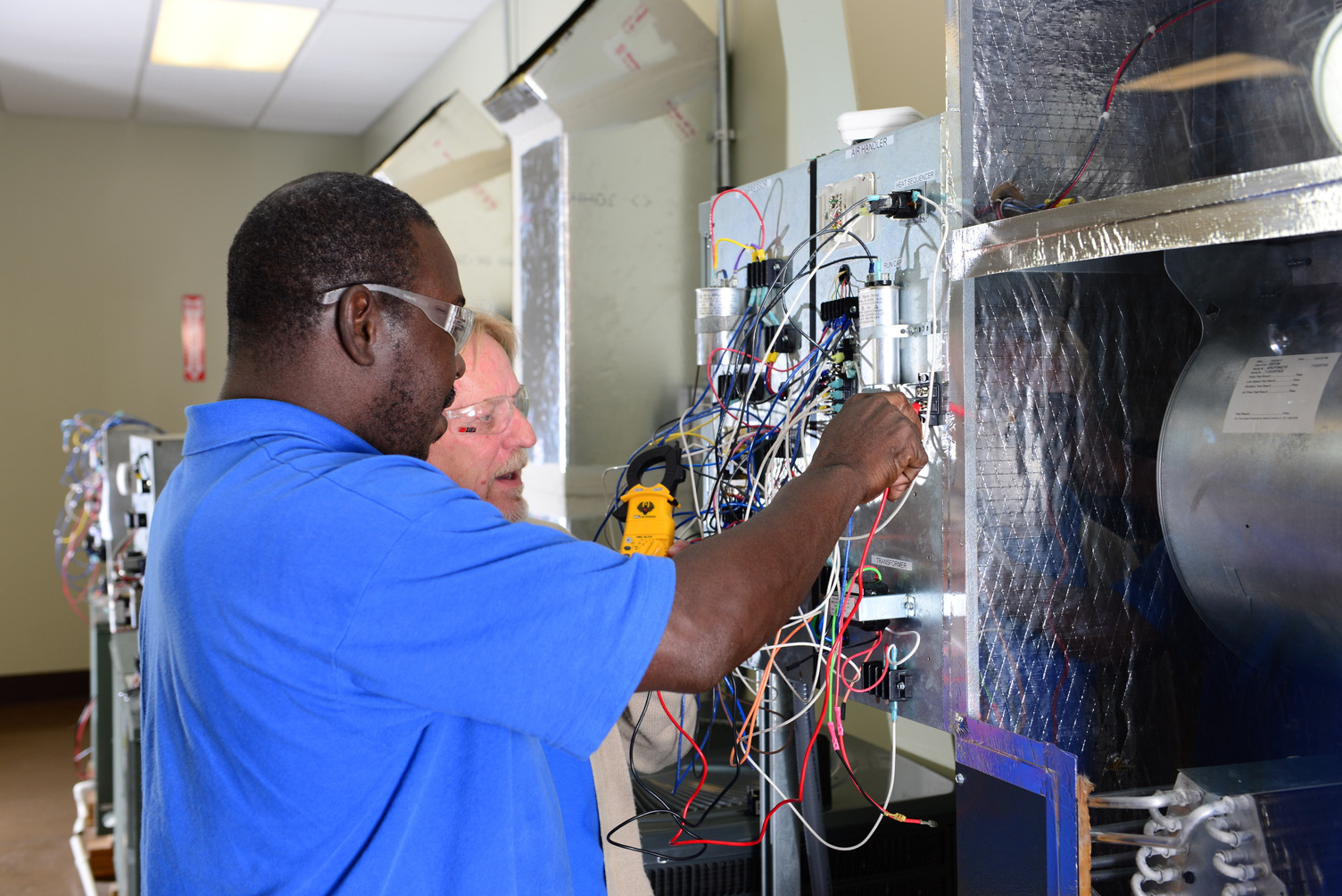RSI is a Great Training Option for Everyone
Learn more about how we can prepare you to advance your career.
Basic electrical training is the starting point for anyone interested in pursuing work in the electrical trades. These programs are designed to teach foundational skills and knowledge, preparing students for entry-level roles under the supervision of licensed electricians. At The Refrigeration School, Inc. (RSI), electrician training combines classroom instruction with hands-on practice to build real-world ability.
The RSI Electrical Applications program in Phoenix, AZ, helps students understand how electrical systems work, how to read blueprints, and how to follow national and local codes. By the end of the program, graduates should be ready to assist on job sites or continue building toward licensure through an apprenticeship.
Electrical Fundamentals Taught in the Classroom
Classroom instruction provides the theoretical knowledge behind electrical systems. In basic electrical training, students start with electrical theory, learning concepts like voltage, current, resistance, and power. These principles help explain how electricity flows through circuits and how different components interact.
Students also learn to apply Ohm’s Law, which connects these variables and serves as a foundation for safe and accurate troubleshooting. Additional classroom topics often include:
- The National Electrical Code (NEC)
- Electrical symbols and diagrams
- Load calculations
- Blueprint reading
- Job site safety protocols
This academic portion of electrician training programs is essential for understanding why electrical systems work the way they do. It also prepares students to recognize and avoid hazards on the job.
Get Started on the Path to a New Career
Fill out our form to learn how we can help you change your life.
Skills Developed in the Lab
While theory is important, basic electrical training focuses heavily on practical skills. Students spend time in lab environments designed to simulate real-world job sites. This is where they learn how to work safely and efficiently with tools, wiring, and electrical components.
One of the most important areas of hands-on training is the use of basic electrical tools.
Students practice with:
- Pliers and wire strippers
- Voltage testers and multimeters
- Conduit benders
- Power drills
- Screwdrivers, nut drivers, and tool belts
In addition to tool handling, students install and troubleshoot wiring in residential and light commercial mock-ups. They might wire circuits, install outlets and switches, or set up breaker panels under instructor supervision. This kind of repetitive, real-world practice builds muscle memory and confidence.
Safety is integrated throughout every lab session. Students are taught to follow lockout/tagout procedures, check for live circuits, and maintain proper personal protective equipment (PPE) at all times. By the end of training, students should be comfortable working in a professional environment under the guidance of experienced electricians.
Pathways After Basic Training
Completing basic electrical training opens the door to a number of entry-level roles. Graduates may find work as electrician helpers or apprentices, assisting licensed professionals with installations, maintenance, and repairs.
Entry-level jobs typically involve tasks like pulling wire, setting boxes, preparing materials, and cleaning up job sites. While these responsibilities may seem simple, they provide the groundwork for mastering more advanced electrical work over time.
Depending on the state, graduates may also need to join a registered apprenticeship to continue toward licensure. Many electrician training programs, including those at RSI, are designed to prepare students to enter apprenticeships with confidence and a solid technical foundation.
Next Steps: Certification and Career Growth
For those who want to advance beyond the basics, electrician training doesn’t stop after the first program. With experience, apprentices can work toward journeyman and eventually master electrician status, depending on their state’s licensing requirements.
Certifications such as OSHA 10, OSHA 30, or even specialized manufacturer credentials may also enhance job prospects. Some individuals may choose to specialize in areas like industrial systems, solar power, or low-voltage installations.
Continuing education and on-the-job experience are necessary for long-term career growth. Basic electrical training provides the first structured step into a trade that rewards reliability, attention to detail, and technical ability.
Getting Started with Electrician Training
Electrician training starts with the fundamentals. A strong basic electrical training program covers the theory, tools, and techniques needed to begin working in the field. Through a mix of classroom instruction and hands-on lab work, students learn how to stay safe, solve problems, and contribute to real job sites.
For anyone looking to begin a career in the electrical trades, programs like those offered at The Refrigeration School, Inc. (RSI) provides a direct and practical starting point. With the right preparation, the path from student to skilled electrician begins with learning the basics—and applying them every day on the job.
To learn more about enrollment, program options, or class schedules, contact RSI or call 1-855-935-0486 today.




